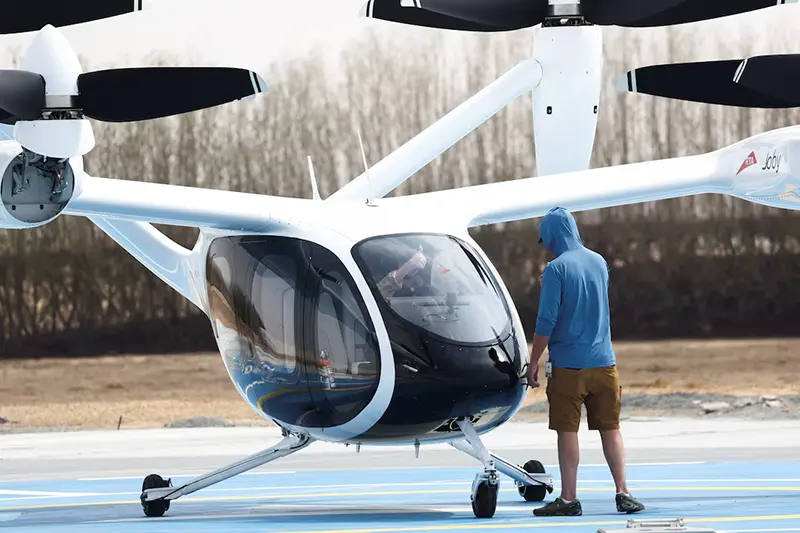By Abdelhadi Ramahi, Amr Alfiky and Luke Tyson
July 1, 2025 – 10:05 AM PDT

DUBAI (Reuters) – Dubai commuters may soon have a new way to skip traffic: air taxis.
Joby Aviation conducted the first test flight of its fully-electric air taxi in the emirate this week, a major milestone in the city’s efforts to integrate airborne transport into existing mobility networks as early as next year.
Joby hopes its air-taxis will ease pressure on existing ground transportation and offer travelers a faster alternative as Dubai faces increasing congestion.
“We want to change the way people commute,” Anthony Khoury, Joby’s UAE General Manager, said.
A journey from Dubai’s main airport DXB to Palm Jumeirah aboard the Joby Aerial Taxi will take roughly twelve minutes, the company predicts, as opposed to 45 minutes by car.
While Joby’s long-term ambition is to make its aerial taxis “affordable for everybody to use,” Khoury says, they acknowledge early pricing will likely target higher-income travelers. “As with any novel technology, early days might be a bit more premium.”
The demonstration flight was held on Monday at an isolated desert site southeast of Dubai’s downtown and was designed to emulate a typical aerial taxi journey, according to Joby Aviation officials.
In a ceremony attended by senior government officials, transport executives and company representatives, the experimental aircraft executed a vertical takeoff, flew for several miles, and then returned for a vertical landing.
The Joby Aerial Taxi, the flagship electric vertical take-off and landing (eVTOL) aircraft developed by the California-based company, can fly distances of up to 160 kilometers (100 miles) at speeds reaching 320km/hr (200mph).
Fully electric, with zero operating emissions, Joby’s air-taxi is designed to be both eco-friendly and quiet enough for commercial use in dense urban areas.
“It will be flying in the city, next to residential areas, and hopefully people will barely notice it,” Khoury said.
While eVTOLs such as Joby’s have been hailed as the future of urban air the industry still faces major hurdles — including securing regulatory approval and developing sufficient vertiport infrastructure.
Morgan Stanley downgraded Joby’s stock price target from $10 to $7 in April, flagging near-term execution risks and broader aerospace industry concerns, including tariffs and supply-chain issues. Joby is currently trading at $10.55.
In early 2024, Joby signed a contract with Dubai’s Roads and Transit Authority that awarded the company exclusive rights to operate aerial taxis in the city for the next six years.
The company plans to inaugurate the emirate’s commercial air-taxi service in 2026, with four initial vertiports located at Dubai International Airport (DXB), Palm Jumeirah, Dubai Downtown and Dubai Marina.
“In aviation, you don’t see transformations like this,” said Didier Papadopoulos, Joby’s President of Original Equipment Manufacturing.
“Every once in a while, you have this propulsive move into the future. What you’re witnessing here is really exciting, and I’m excited for you to be riding this one point in the future.”
Reporting by Abdelhadi Ramahi and Luke Tyson in Dubai; editing by Maha El Dahan, Editing by Louise Heavens
What do YOU think? Click here to jump to the comments!
Sponsored Content Below

